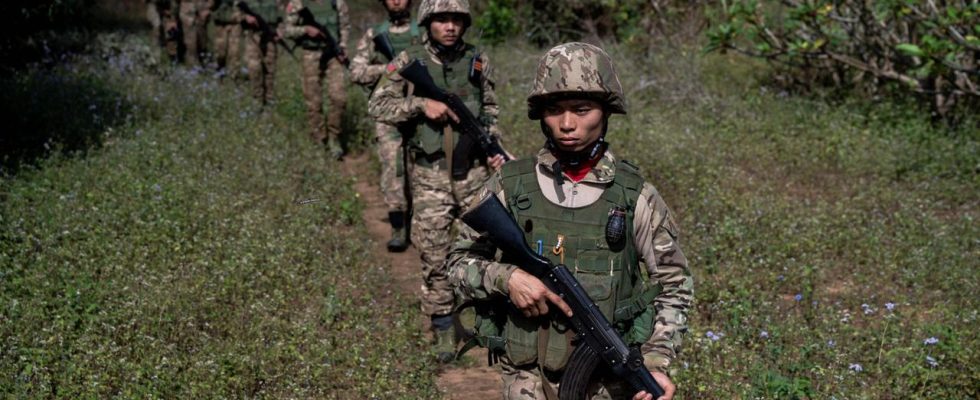Three years ago, the military seized power in Myanmar. But armed resistance against the junta is growing. Support is also dwindling within our own ranks.
Ma Ei stands in a bare room with exposed walls. The textile worker from Myanmar fled to neighboring Thailand with her daughter and husband – from the violence of the military.
“I miss my home, especially in the evening. It’s not the same here,” she says. Tears roll down her cheeks. Ma Ei is one of more than two million Burmese displaced from their homeland since the military’s coup three years ago. Thousands of people were killed, including around 1,600 civilians and around 20,000 political activists are still in prison today, according to the United Nations (UN).
Ma Ei hears cruel news from friends and relatives who still live in the country: about torture, violence, and arbitrary arrests by the military. She regularly watches news from exiled media on her cell phone. The economy in Myanmar is reeling and unemployment is high. There is no longer enough money for necessary food such as rice or oil. The UN estimates that more than one in three people in Myanmar are dependent on humanitarian aid.
opposition forces fight against junta
Phil Robertson from the human rights organization Human Rights Watch speaks of a humanitarian catastrophe. “We are now in the third year after the military coup. It is time for the international community to stop sitting back. The EU and others must get more involved,” he demands.
The dramatic situation in Myanmar has worsened again since last October. Armed opposition forces have launched a coordinated offensive against the military regime. Since then, they have taken control of several cities and border crossings with India and China.
A commander of the opposition fighters told the AFP news agency: “We are not fighting in this revolution to get rich. We are fighting for a better Myanmar. We are determined and not afraid. Even when the fighter jets come, we now joke that they only fly because they have too much fuel left.”
Military launches indiscriminate airstrikes
The reality is: the population is defenseless against the air strikes by the Myanmar military. Since the junta has suffered one setback after another, it has increasingly bombed villages indiscriminately from the air. Innocent civilians keep dying.
According to investigations by a UN fact-finding group on Myanmar, since the 2021 coup there have been mass killings of prisoners, dismemberment and desecration of corpses, rape,
Junta “is weaker than it has been in decades”
Nevertheless, thanks to coordinated attacks, the armed opposition fighters have now gained control over several parts of the country. The military is weaker than it has been in decades, says Professor Thitinan Pongsudhirak from Chulalongkorn University in Thailand. “The military junta can no longer win the civil war in Myanmar,” he says. The military now needs to “hold some cities, use some heavier weapons, artillery and air strikes to buy time.”
The junta is losing troops every day, but is getting “no new recruits, no reinforcements and no supplies,” Pongsudhirak continued: “So the troops are no longer willing to go on patrols, they could be ambushed. The resistance has the upper hand right now .”
Growing discontent in the ranks of the military
Security expert Richard Horsey from the Crisis Group is much more skeptical. But he also says: “The military has its back against the wall. They know that the only way out for them is to keep fighting, and they will do so with great determination.” A military defeat is by no means certain, but it is more likely than at any time in many decades.
Discontent in the military is growing, soldiers are deserting, and criticism of junta leader Min Aung Hlaing is becoming louder. There is now even discussion within our own ranks about his replacement. Would it not be better to replace the junta leader with his deputy?
Free elections are probably a long way off
This would probably change little about the political course. The junta repeatedly emphasizes that it must rid the country of “terrorists,” as it calls the resistance fighters. Until that is achieved, there cannot be the promised elections.
“I think the word election always has to be put in quotation marks in the context of the current regime,” says Jasmin Lorch, political scientist at the German Institute for Development and Sustainability. The military’s real goal is to “legitimize itself in its own positions of power” and then “to somehow move on to a form of seemingly civilian rule, while basically the military itself wants to keep the reins in its own hands.”
Junta extended state of emergency
To mark the anniversary, the military once again extended the state of emergency by six months. This will further delay possible elections. The US responded with further sanctions against members of the military. This is intended to make it more difficult to supply aviation fuel for fighter jets, as well as domestic weapons production.
The current developments in her homeland give the textile worker Ma Ei in Thailand hope: “I was pretty depressed that I might only be able to return to Myanmar in 10 or 15 years. But because of the opposition’s successes – maybe it will work in a few years months?”
Most observers are not that optimistic. But Myanmar is at a crucial turning point three years after the military coup.
Jennifer Johnston, ARD Singapore, tagesschau, February 1, 2024 6:24 a.m

